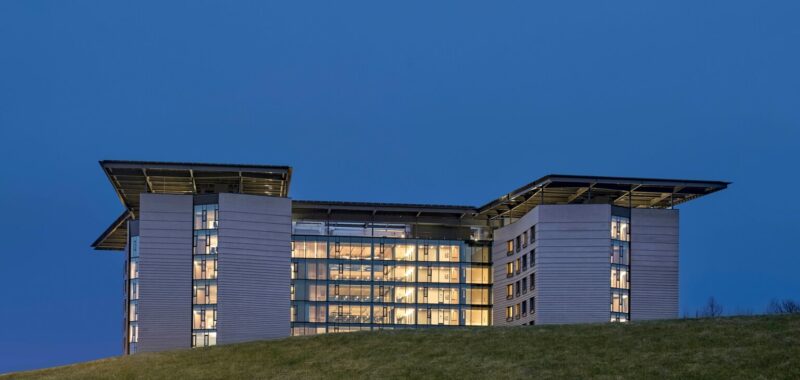Chelsea, Massachusetts, is a city of 38,000 people just north of Boston. (East Boston, to be exact.) In Chelsea’s historic Powder Horn Hill neighborhood, a new hospital that provides long-term care for veterans by Payette opened its doors last year.
The new Massachusetts Veterans Home at Chelsea provides 154 beds for long-term care. The 6-story building is uniquely suited to serve patients with dementia. It has a chapel, a central kitchen, community and activity spaces, physical and occupational therapy rooms, and administrative offices.
Payette successfully fit this programming within a 247,000-square-foot envelope that sits gently above verdant gardens and courtyards. The new building stands out from its context which is mostly defined by detached 2- and 3-family houses thanks to its impressive 0.7-megawatt rooftop solar array that both saves on energy and provides an attractive cantilever.

Replacing Old With New
To make way for the new care center, the state of Massachusetts demolished Quigley Memorial Hospital, a structure from 1882 built to serve Civil War veterans. The old hospital was what one may expect: Single-occupancy rooms, dim corridors, bad lighting, decrepit facilities, and an overall creepy vibe that recalled Martin Scorsese’s Shutter Island.
After Quigley Memorial Hospital’s demolition, a 10-year masterplan kicked off to build the Massachusetts Veterans Home at Chelsea. Looking ahead, the effort will also yield significant improvements to Malone Park which sits just below the care center.

Good facilities for veterans became a top priority in the Commonwealth after a series of scandals made headlines during COVID-19. In Holyoke, Massachusetts, at a veterans center run by the state, 76 patients died in the first few months of shut down. Lawsuits ensued, and the deaths called attention to the macabre conditions of so many state-run hospitals.
At Chelsea Veterans Home, 31 people died from COVID-19 and patients alleged living under conditions that were “unsanitary, unfit, and unacceptable.” Quigley Memorial Hospital’s demolition quickly followed, and construction on the new Massachusetts Veterans Home at Chelsea ensued.

Payette worked with multiple stakeholders to design the new center, including the state’s Department of Veterans Services, Department of Health and Human Services and Asset Management Board. Full-scale mockups of rooms were built so that patients could provide insight into their needs.
Payette’s facility embodies “compassion, dignity, and sustainability”
In plan, the new care center is shaped like an H. The core is located in the center while patient rooms are in the wings. Every residential space has natural ventilation. This feature alone reduced energy consumption by 71 percent less than allowed by code.
The facade is defined by its use of cast stone unit masonry. The stonework features a “careful gradation of linear texture,” shared Payette architect Sarah Radding of the team’s work. Thick window surrounds further separate and accentuate the windows from the beige exterior.



Above all, the new facility embodies “compassion, dignity, and sustainability,” architects from Payette shared. Dr. Jon Santiago, Massachusetts VA Secretary, said the center is the “most magnificent healthcare building” he had ever seen.
Senator Elizabeth Warren said the new facility will “ensure our veterans get the care they have earned and deserved.”

